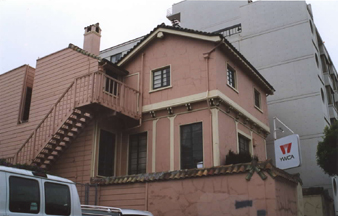|
|
|
|
|
|
|
|
|
|
|
|
Soko Bukai v. San Francisco: Whose Y?
By Jessi Hempel
Four years have passed since the Soko Bukai, an association of three Japanese American churches, filed suit against the San Francisco YWCA for ownership of a pink stucco building in San Francisco's Japantown. With a trial scheduled for this fall, descendants of the Japanese Issei anxiously await their day in court.But now the YWCA has filed a motion to postpone the trial date for one year, prompting some Japanese Americans to ask why they are holding the case up in court.
 |
| 1830 Sutter Street |
At issue is the title to 1830 Sutter Street. It currently houses a Japanese bilingual and mulitilingual childcare program, an after-school program for African American teen girls, and the YWCA's administrative offices. Legally, the YWCA holds the title to the property. Soko Bukai leaders believe the YWCA promised to hold the property in trust for their ancestors, first generation Japanese immigrant women referred to as Issei, who raised the funds but were restricted from purchasing the property by California's stringent alien land laws.
The promise would have been forgotten had the YWCA not decided to sell the property in 1996, serving eviction notices to the two programs occupying the building. This prompted Japanese American community groups to come together "because they wanted first choice [of building ownership] to go to Japanese community-based organizations," said Cathy Inamasu, Executive Director of Nihonmachi Little Friends.
"One sweet 90-year-old lady had this notion..." said Chris Hirano, community development director for the Japanese Cultural and Community Center of Northern California (JCCCNC). The woman, Michi Onuma, was a YWCA participant from the 1920's, according to Hirano, whose memory of Issei fundraising prompted Japanese Americans to do some research.
By looking through minutes from the early 1920s willingly provided by the YWCA as well as the diary of Mrs. Abiko, a founding member of the Japanese YWCA, Japanese Americans discovered documentation they believe indicates the YWCA used funds raised by the Issei to purchase the building and then held the building in trust for the Japanese community.
Alien Land Laws
The Soko Bukai established "the Japanese YWCA" in 1912, according to Soko Bukai attorney Don Tamaki, "as an independent organization to provide services for immigrant Japanese women and girls." It adopted the term YWCA even though it was a separate organization with its own board of directors.
Despite a progressive mission "to end racism and empower women," the San Francisco YWCA's facilities were segregated. So when the Issei needed facilities to house their services, they raised funds to purchase the 1830 Sutter property in 1920, said Tamaki. But California's alien land laws, in effect from 1913 until 1956, prohibited the Issei from purchasing or leasing property.
Minutes from an executive board meeting held on May 28, 1920, report that "the Japanese people raised funds to purchase a house to be used for the Japanese YWCA. This property to be bought by the local association and held in trust for the Japanese YWCA." Minutes from the September 8, 1922, board meeting said that if the property was sold, "the funds shall be applied to Christian work for Japanese women and girls in San Francisco after consultation with the Japanese YWCA Board of their successors."
Memories of Internment
The removal of more than 5,000 Japanese Americans from San Francisco to internment camps in 1942 ended the Japanese-focused YWCA programming in the Sutter Street YWCA. The American Friends Service Committee, a Quaker organization that provided assistance to relocated Japanese Americans, leased the building during the war years, said Hirano.
The YWCA returned after the war, but the original board of the Japanese YWCA never reconvened. When Cathy Inamasu became Executive Director of Nihonmachi Little Friends in 1987, she knew only that the YWCA was called the "Japantown YWCA."
Mission of YWCA
"I don't think the suit is really about what happened to the Japanese American community during World War II," said YWCA board member Michele Stratton. "I understand that at the time the San Francisco YWCA not only abhorred the internment, but made public appeals and continued to help people in the camps as much as the government permitted, and welcomed its members back on their return."
Historically, the YWCA has played a crucial part in providing social services to immigrant communities, and Stratton said the decision to sell the property emerged from an examination of the most strategic way to provide its programming. "There has been a tendency in the YWCAs generally not to be so location-based but program-based. We are not as well located for those services at 1830 Sutter Street as we are in other places."
The Soko Bukai will propose to the court that a nonprofit organization be formed to take the title. "We'll even give the YWCA a seat on the board."
Hirano stressed the YWCA has provided important services historically for the immigrant community and cautioned that the current YWCA staff is not to blame for the lawsuit, "It's like finding out you are adopted 80 years later. They [YWCA staff] had no idea about the history of the building. However, they do have the opportunity to make amends, to make things right."
With a new court date not yet set, it may be awhile before anyone decides whether the YWCA will be forced to honor a promise made 80 years earlier to the Issei.